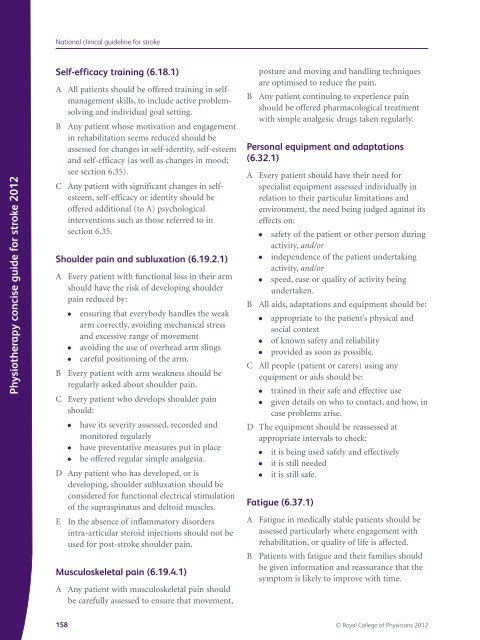national-clinical-guidelines-for-stroke-fourth-edition
national-clinical-guidelines-for-stroke-fourth-edition
national-clinical-guidelines-for-stroke-fourth-edition
You also want an ePaper? Increase the reach of your titles
YUMPU automatically turns print PDFs into web optimized ePapers that Google loves.
Physiotherapy concise guide <strong>for</strong> <strong>stroke</strong> 2012<br />
National <strong>clinical</strong> guideline <strong>for</strong> <strong>stroke</strong><br />
Self-efficacy training (6.18.1)<br />
A All patients should be offered training in selfmanagement<br />
skills, to include active problemsolving<br />
and individual goal setting.<br />
B Any patient whose motivation and engagement<br />
in rehabilitation seems reduced should be<br />
assessed <strong>for</strong> changes in self-identity, self-esteem<br />
and self-efficacy (as well as changes in mood;<br />
see section 6.35).<br />
C Any patient with significant changes in selfesteem,<br />
self-efficacy or identity should be<br />
offered additional (to A) psychological<br />
interventions such as those referred to in<br />
section 6.35.<br />
Shoulder pain and subluxation (6.19.2.1)<br />
A Every patient with functional loss in their arm<br />
should have the risk of developing shoulder<br />
pain reduced by:<br />
● ensuring that everybody handles the weak<br />
arm correctly, avoiding mechanical stress<br />
and excessive range of movement<br />
● avoiding the use of overhead arm slings<br />
● careful positioning of the arm.<br />
B Every patient with arm weakness should be<br />
regularly asked about shoulder pain.<br />
C Every patient who develops shoulder pain<br />
should:<br />
● have its severity assessed, recorded and<br />
monitored regularly<br />
● have preventative measures put in place<br />
● be offered regular simple analgesia.<br />
D Any patient who has developed, or is<br />
developing, shoulder subluxation should be<br />
considered <strong>for</strong> functional electrical stimulation<br />
of the supraspinatus and deltoid muscles.<br />
E In the absence of inflammatory disorders<br />
intra-articular steroid injections should not be<br />
used <strong>for</strong> post-<strong>stroke</strong> shoulder pain.<br />
Musculoskeletal pain (6.19.4.1)<br />
A Any patient with musculoskeletal pain should<br />
be carefully assessed to ensure that movement,<br />
posture and moving and handling techniques<br />
are optimised to reduce the pain.<br />
B Any patient continuing to experience pain<br />
should be offered pharmacological treatment<br />
with simple analgesic drugs taken regularly.<br />
Personal equipment and adaptations<br />
(6.32.1)<br />
A Every patient should have their need <strong>for</strong><br />
specialist equipment assessed individually in<br />
relation to their particular limitations and<br />
environment, the need being judged against its<br />
effects on:<br />
● safety of the patient or other person during<br />
activity, and/or<br />
● independence of the patient undertaking<br />
activity, and/or<br />
● speed, ease or quality of activity being<br />
undertaken.<br />
B All aids, adaptations and equipment should be:<br />
● appropriate to the patient’s physical and<br />
social context<br />
● of known safety and reliability<br />
● provided as soon as possible.<br />
C All people (patient or carers) using any<br />
equipment or aids should be:<br />
● trained in their safe and effective use<br />
● given details on who to contact, and how, in<br />
case problems arise.<br />
D The equipment should be reassessed at<br />
appropriate intervals to check:<br />
● it is being used safely and effectively<br />
● it is still needed<br />
● it is still safe.<br />
Fatigue (6.37.1)<br />
A Fatigue in medically stable patients should be<br />
assessed particularly where engagement with<br />
rehabilitation, or quality of life is affected.<br />
B Patients with fatigue and their families should<br />
be given in<strong>for</strong>mation and reassurance that the<br />
symptom is likely to improve with time.<br />
158 © Royal College of Physicians 2012


